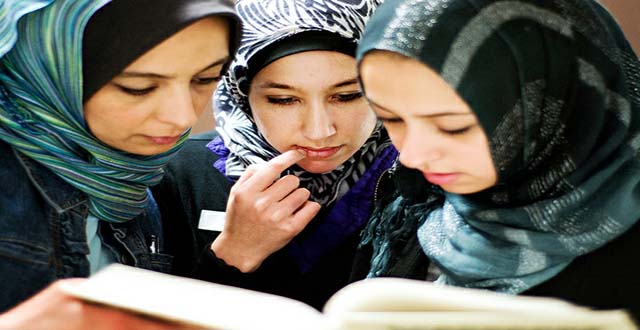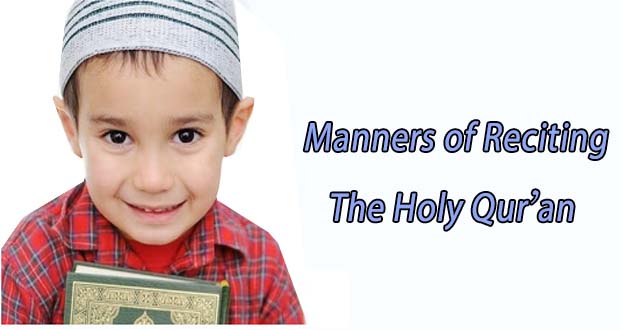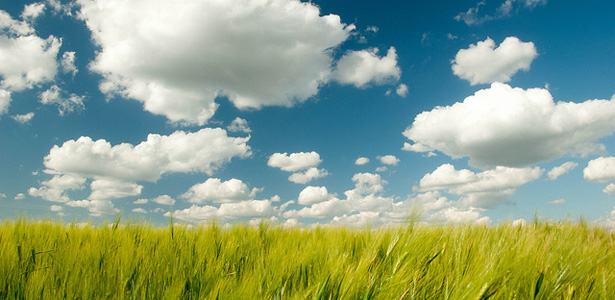
Now that we know that the Holy Qur’an is not an ordinary book, but a Divine Book sent by Allah for the guidance of all people, we must show respect to it. Here are some of the points we need to remember.
1. A part of the Qur’an carries the same respect as the entire Qur’an. Allah says:
When the Qur’an is recited, listen to it (7:204).
We know that when recitation takes place it is always of a part of the Qur’an. Even then Allah uses the word Qur’an for the part that is being recited. Therefore, if you have a Siparah, a binder or a booklet that contains Soorahs and passages from the Qur’an, you treat it like a Qur’an.
2. The Qur’an should always be carried with proper care. When your Madrasah bag contains the Qur’an, or a part of it, take extra care of the bag. Keep the bag slowly on the desk or floor instead of letting it fall on its own. Use both hands to remove the Qur’an from your bag, kiss the cover of the Qur’an, place it slowly on a desk (or on a wooden carrier specially built for holding the Qur’an) and open the pages gently.
3. When the Qur’an is being recited, listen to it and be attentive (7:204). If you are busy with something else then at least do not disturb the recitation by talking, for example, or making noise. There is reward for listening to the Qur’an. Imam Ali Zaynul ‘Aabideen (a) said: Whoever listens to a letter of the book of Allah, the Glorious and Almighty, without even reading it, Allah will write down for him one good deed, forgive a sin, and raise him a degree.
It was the practice of unbelievers in Mecca to make a lot of noise so that others could not listen to the Qur’an (41:26). Do not be like them and instead lend your ears to the Qur’an and give it respect. We often wish that God would talk to us. One way to achieve this is by reading the Qur’an. Prophet Muhammad (S): said: Lo! Whoever has longing for Allah should listen to the word of Allah! Also, if you wish to talk to God then do Tilaawa. Prophet Muhammad (S) said: Whenever one of you would like to talk to his Lord, he should read the Qur’an.
4. The Qur’an should be recited regularly. It is disrespect to keep the Holy Qur’an unread. Prophet Muhammad (S) said: Brighten your homes with reciting Qur’an; do not turn them into graves. Surely the house in which a lot of recitation takes place enjoys many blessings and the members benefit from it. Such a household shines for the inhabitants of Heaven as stars shine to the inhabitants of the earth. On the Day of Judgment the Prophet will complain to Allah about some Muslims who had abandoned the Qur’an (25:30).
Another Hadith of the Prophet (S) says: Indeed hearts rust in the same way irons rust. He was asked: “What will polish the hearts?” The Prophet answered: Reading the Qur’an. The more Qur’an we read the better it is. We should discipline ourselves to read a good portion of Qur’an daily. Imam Ali (a) said: He who recites 100 verses daily from the Book in the order it is in, Allah writes for him the reward equal to all the good actions of every one on this earth. Shaytaan would like us not to read, understand and study the Qur’an. Let us fight him with all our strength and faith. Imam Ja‘far As-Saadiq (a) said: There is nothing more unpleasant to Shaytaan than to see a man reading the Qur’an to gain insight.
5. Children should get familiarized with the Qur’an early in their lives. Imam as-Saadiq (AS) said: He who recites Qur’an while he is young, Qur’an mixes with his flesh and his blood, and Allah places him amongst the blessed and the chosen righteous. On the Day of Judgment, Qur’an shall become his defender and [pray for him a handsome reward.]
6. It is the right and respect of the Qur’an that it should be followed. Imam Ja‘far Saadiq (a) said: Lo! One, who learns the Qur’an, teaches it and practices according to it, I will guide and lead him to Paradise.
7. Take the interpretations of the Qur’an from the Holy Prophet (S) and the Imams from his family, i.e. the Ahlul Bayt (a). Imam Hasan al-‘Askaree quoting Prophet Muhammad said: Recite it (i.e. the Qur’an) as Allah gives you ten rewards for each letter that you recite from it. Then the Imam (a) said: Do you know who really holds fast to it and reaches to such honor and reward? He is the person who takes Qur’an and its interpretation from us Ahlul-Bayt (a) or from the deputies that we send to our followers, and takes its (interpretation) neither from the opinions of those who argue (on the speech of Allah) nor form the analogy of those who compare (different parts of the speech of Allah).








